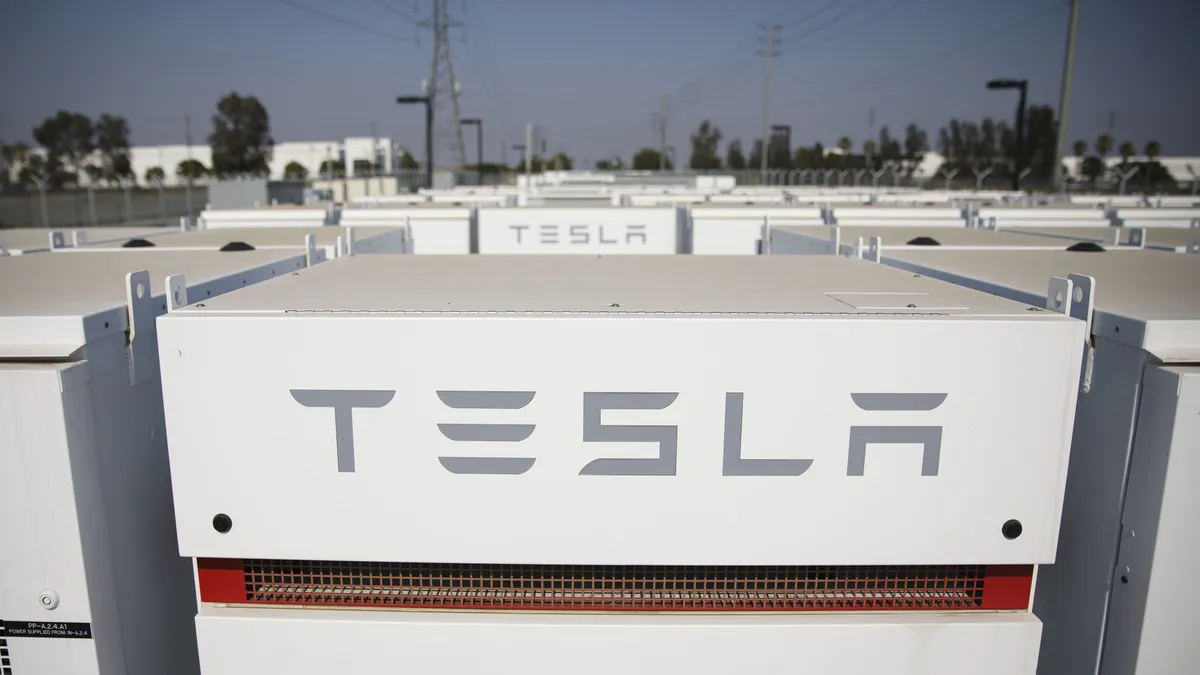Dive Brief:
-
Tesla cannot meet the "tremendous demand" in 2020 for its energy storage products, like the large-scale Megapack battery systems, co-founder and CEO Elon Musk said during the company's Q1 earnings call on Wednesday.
-
The company announced the deployment of 260 MWh of storage in the first quarter of 2020 — a 51% reduction from the 530 MWh deployed in the fourth quarter of 2019, but a 14% year-on-year increase. Energy deployments in general were restricted due to COVID-19, according to Chief Financial Officer Zachary Kirkhorn.
- Even after resuming operations paused by COVID-19 at its domestic production facilities, global economic conditions could hit the demand for construction projects like solar energy systems, the company said in its 10-Q filing with the U.S. Securities and Exchange Commission.
Dive Insight:
The company lists several COVID-19 impacts in its SEC filing, such as suspensions of operations at its facilities in Shanghai and New York, and deployment delays caused by closed government offices and businesses.
The pandemic is spurring the company to take a closer look at its cost structure, Musk said on the call.
"And we came to a conclusion that… the right move was actually to continue to expand rapidly, continue to invest in the future and in new technologies, even though it is risky. And we've talked to some of our key investors, and they support that approach as well," he said, adding that long-term prospects for Tesla are extremely good.
The company believes it will continue to grow once its energy operations resume, according to its SEC filing, including with the Megapack — "for which the demand is currently far outpacing our production capacity."
"We have seen an inflection point in interest for utility level storage, primarily driven by progress in reducing costs. At the moment, the demand level for this product remains above our capacity," the company said in its update.
One area of opportunity Tesla has identified is cross-selling between solar and storage systems, since many customers who want solar opt to pair it with storage. In total, first-quarter revenue from energy generation and storage decreased by $31 million — 10% — year-over-year.
On the solar front, Tesla deployed 35 MW this quarter, compared to 54 MW during the prior quarter. The company is ramping up production and installation of Solar Roof — an energy system made of tempered glass roof tiles —but the COVID-19 pandemic has "essentially shut us down, both from the ability to install and the ability to get permits," Musk said.
Tesla has been able to drive down costs very quickly for its storage products, likely leading to a strong uptake for them, Omeed Badkoobeh, CEO of storage company Yotta Energy, told Utility Dive. While the price of lithium-ion batteries has been dropping quite rapidly across the sector because of the adoption of electric vehicles and consumer electronics, Tesla has the added advantage of volume.
"They are able to drive down costs simply on value. When they decide to purchase batteries, they are purchasing them for all their vehicles as well as the energy storage products," he said.
The drop in storage deployments between the fourth quarter of 2019 and first quarter of 2020 could be because solar and storage products generally tend to fly off the shelves more towards the end of the year, in part to align with incentives, according to Badkoobeh. He questioned, however, whether the suspension of vehicular production could affect energy storage production in any way. Cell supply has always been an issue for Tesla, and when vehicles are taking off really well, there are less cells for storage products.
"It’ll be interesting to see how some of the current conditions, not being able to produce vehicles, might actually shift production towards the energy storage products," he said.
As demand for energy storage adoption has increased, battery module suppliers have been adding manufacturing capacity, leading to cost reductions, ICF Senior Manager Todd Tolliver said in an email.
"Additionally, the battery system integrator space supporting utility scale projects has become quite crowded in the last year, where Tesla’s Megapack product is a relatively new entrant. The crowded space has increased competition and is also a contributing factor to the observed cost reductions," he added.















